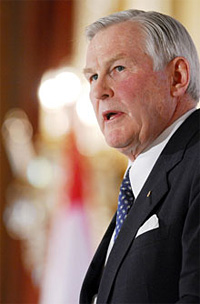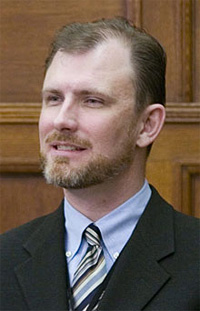
|
 |
 |
 Editorials | Issues | March 2008 Editorials | Issues | March 2008  
Anatomy of a Leak: What We Know About NAFTA-Gate
 Neil MacDonald - CBC News Neil MacDonald - CBC News
go to original


| | Michael Wilson, Canadian ambassador to United States, speaks at a luncheon in Toronto, January 22, 2007. (Aaron Harris/Canadian Press) | 
| | Prime Minister Stephen Harper's Chief of Staff Ian Brodie watches from the back of the room during a photo op before the government caucus meeting on Parliament Hill, March 5, 2008. (Tom Hanson/Canadian Press) | | |
In a bit of wishful thinking that was almost plaintive, the Canadian embassy here in Washington said last week there is "nothing more to be said" on the so-called NAFTA-gate leaks, the ones involving Barack Obama's purported stand on the North American free trade deal.

The department of foreign affairs has issued official statements on the matter and Prime Minister Stephen Harper has spoken, said embassy spokeswoman Sally Southey.

So, case closed.

It is understandable the embassy would desire such an outcome, especially with a team of investigators, dispatched on the orders of the prime minister, conducting interviews and sifting through diplomats' e-mail accounts in search of the leaker. Or leakers.

But if the investigators have not yet spoken to Canada's ambassador to Washington, the former Mulroney-era finance minister Michael Wilson, they might want to have a word.

Wilson, appointed to the ambassador's post two years ago by Harper, clearly played a role in shaping the story that so angered the Obama campaign last week and helped his Democratic rival Hillary Clinton win the Ohio primary.

In reconstructing the events, an extraordinary string of mistakes, misstatements and mischaracterizations emerge that, taken together, add up to an account that was "blatantly unfair" to Obama, to use the prime minister's term.

At the beginning

This story began on Feb. 8, when Canadian consular officials in Chicago finally, after several entreaties, persuaded Austan Goolsbee to speak with them. Goolsbee is a well-known professor of economics in that city and, more importantly, an adviser to presidential hopeful Barack Obama.

Canadian officials here in the U.S. have identified several such high-level advisers in the different campaigns and "hound them" relentlessly, as one diplomat puts it, for meetings. The logic is that some of these people could eventually wind up in cabinet or in close proximity to power, and the earlier Canadian officials can lobby them, the better for Canada's national interests.

During a session with Georges Rioux, the consul general in Chicago, and Joseph DeMora, one of Rioux's underlings, Goolsbee talked about some of Obama's policies and a range of other economic matters. As diplomats always do, DeMora reported the meeting to his masters in foreign affairs.

"Goolsbee candidly acknowledged," said his summary, "the protectionist sentiment that has emerged, particularly in the Midwest, during the primary campaign. Consistent with [the consulate's] analysis, he cautioned that this messaging should not be taken out of context, and should be viewed as more about political positioning than a clear articulation of policy plans."

DeMora said Goolsbee reported that Obama would try to strike just the right note without sounding too protectionist.

That much, at least, would turn out to be true.

The consulate dispatched the summary to headquarters in Ottawa, where it was shared with other senior officials, including those in the Privy Council Office, the arm of government that connects the prime minister with the bureaucracy.

It would eventually rise to become one of the most controversial documents ever authored by a Canadian diplomat.

The lock-up leak

Fast forward to Tuesday, Feb. 26.

Much of Ottawa's parliamentary press corps was "locked up" with government officials, parsing the finance minister's newest budget. Such occasions are a chance to chat with some important people, some of whom are normally not very accessible.

One of these hard-to-reach types is Ian Brodie, the prime minister's chief of staff, who was in the lock-up that day. Brodie is a political appointee who works in the Prime Minister's Office, not the Privy Council Office, but the wall between those two institutions is porous, and Brodie knew something about the intelligence gathered by Canadian diplomats in the United States, and decided to share it.

By that time, both Clinton and Obama were slugging it out in the crucial state of Ohio, where the North American Free Trade Agreement is widely blamed for massive job losses.

Both candidates were talking about re-opening the agreement and renegotiating certain sections in order to toughen its environmental and labour standards.

When a group of reporters from CTV quizzed Brodie about what such declarations meant to Canada, he apparently replied that Ottawa was not worried. Hillary Clinton's people had been in touch, he said, reassuring Canadian officials that they should not take such campaign rhetoric seriously. A CTV reporter privy to the conversation would later publicly confirm what Brodie said.

But an offhand remark by a political staffer is just a starting point so CTV brought Tom Clark, the network's bureau chief in Washington, into the picture. Clark is known to be on friendly terms with ambassador Wilson.

In short order, Clark contacted Wilson, putting to him the tip from Ottawa. We know this because the embassy later confirmed the call. The actual conversation between the two men remains a private discussion, but by the time Clark went to air Wednesday night, his angle was no longer Clinton. It was Obama.

Citing what he would later describe as a "source at a senior level in the embassy," Clark reported that an Obama "operative" had phoned Wilson personally in previous weeks, warning that "Obama would take some heavy swings at the trade deal," but assuring the ambassador it would just be "campaign rhetoric," not to be taken seriously.

The story, Clark emphasized, went beyond trade: "It goes to the question of truthfulness. In other words, did Barack Obama say one thing privately to a foreign government and then say something entirely different to the voters of Ohio and Texas? And it appears tonight that's exactly what he did and that's exactly what the Clinton campaign is zeroing in on," concluded the reporter.

What call?

In saying that, Clark was correct. The sting of the story was its insinuation of hypocrisy, something voters seem to hate more than nearly anything else. The suggestion Obama was a hypocrite would do a great deal of damage on the campaign trail.

But it also left the Washington embassy with a nightmare on its hands.

First of all, there had never been any call from Obama's people to Michael Wilson about the Illinois senator's real intentions. That discrepancy would emerge later.

Obama's campaign was focused on winning in Ohio and could not have cared less about reassuring Wilson or anyone else in Canada.

Second, the thrust of what Clark reported with regards to Obama's campaign statements did not exactly square with the wording of DeMora's summary, which had been sitting in Ottawa, with a copy in the Washington embassy.

Third, the evident leak of any communication between Canadian officials and anyone from the Obama campaign, even if distorted, was a terrible embarrassment.

The Obama campaign was furious. Goolsbee demanded a copy of the summary so that he could see for himself how his comments to the Chicago consular people had been reported. And the embassy agreed to provide him with the four or five paragraphs referring to his views on NAFTA.

When Goolsbee saw the paragraph about how "messaging" in Ohio is merely "political positioning," he objected. That, he said, was not his language.

So the Canadian officials took a closer look. DeMora, it turned out, did not write his summary until five days after the discussion had taken place. And he had no direct quotes to support his characterization of Goolsbee's remarks.

The summary's self-congratulatory aside about Goolsbee agreeing with the consulate's own analysis also raised eyebrows.

One former diplomat said it sounded like "a classic case of the wish becoming the father of the thought."

An apology is issued

So, the embassy apologized directly to Goolsbee and accepted his contention that he had been misrepresented. When the Obama campaign demanded a public denial, the embassy complied.

At no time, it said in a statement, had any official from either campaign contacted the ambassador or any embassy official. An embassy official acknowledged that diplomats here in the U.S. do reach out to campaign advisers, but stressed that at no time had any adviser suggested Barack Obama was misleading voters about his true intentions.

There was no mention, of course, about ambassador Michael Wilson's chat with the CTV's Tom Clark.

And in any event, Hillary Clinton and Republican John McCain weren't listening. Both of them latched onto the hypocrisy angle and rode it hard.

In the days to come, the problem became worse for Obama. CTV, citing sources "at the highest level of the Canadian government," changed its story, naming Goolsbee as the Obama adviser, but substituting Chicago Consul General Georges Rioux as the Canadian contact.

The disclosure of new names ginned up interest in the U.S. media, which had at first been tepid in following the story.

The Obama campaign countered by having Goolsbee speak on the record with Nedra Pickler of the Associated Press.

Having secured the embassy's repudiation of DeMora's summary, he confidently told the AP he was misrepresented.

"This thing about 'it's more about political positioning than a clear articulation of policy plans,' that's this guy's language," Goolsbee said of DeMora. "He's not quoting me. I certainly did not use that phrase in any way."

Damage control not working

But the damage control backfired. Pickler obtained and published the relevant excerpts of the DeMora summary and these were brandished by the Clinton campaign as evidence of the original hypocrisy.

Canadian diplomats, under orders to remain silent, could only watch in anguish as the Obama campaign flailed and the wording of the memo they had acknowledged was flawed continued to drive the storm.

In Parliament, Harper rose to address the subject. But he didn't repeat the embassy's private repudiation of the summary. Instead, he said: "The Canadian embassy in Washington has issued a statement indicating it regretted the fact that information has come out that would imply that Senator Obama has been saying different things in public than in private."

In other words, it certainly is too bad that information came out. Sorry.

Later that week, Harper said the whole episode had been "blatantly unfair" to Obama and promised to find the leak, wherever it may have originated.

For professional diplomats, this is career-ending stuff. The likelihood of another frank conversation with the busy, important powers in Washington has receded significantly.

What's more, given Harper's stated antipathy towards the Canadian diplomatic corps (he complained publicly last year that it has resisted implementing his foreign policy agenda), some of them fear they, rather than the government's political appointees, will bear the punishment for the episode.

As the questions continued, two news organizations wrote that Ian Brodie, Harper's chief of staff, had been CTV's original tipster. The stories generated a storm in the House of Commons, but what really interested the Obama campaign was how the story had so quickly morphed from a tip about Clinton to a story about Obama.

I asked Sally Southey, the Canadian embassy's spokeswoman in Washington, how it could be that CTV began with a tip about Clinton's campaign, but after a conversation with Michael Wilson, wound up reporting a distorted version of an Obama adviser's remarks.

That, she said, is a good question. But, she added: "All conversations the ambassador has on background with journalists are private." | 
 | |
 |



